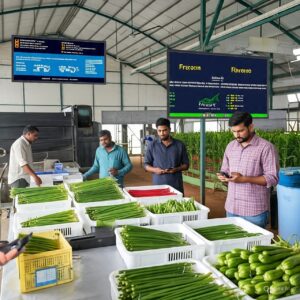
Kerala, often celebrated for its lush landscapes and spice-rich heritage, has long relied on agriculture as a major contributor to its economy. However, traditional systems of agricultural trade in Kerala are increasingly being challenged by inefficiencies, middlemen, and a lack of transparency. Fortunately, the emergence of blockchain technology in Kerala’s agriculture is proving to be a game-changer, offering farmers greater control, transparency, and profitability in the supply chain.
Understanding Blockchain in Agriculture
Before diving into its applications, let’s briefly understand what blockchain technology is. In simple terms, blockchain is a decentralized and immutable digital ledger. It records transactions across a network of computers, ensuring that data cannot be altered without consensus. This makes it an ideal tool for industries that require trust, security, and transparency, like agricultural trade.
Notably, agricultural blockchain technology in Kerala is being explored as a transformative tool to solve long-standing issues such as price manipulation, delayed payments, and lack of product traceability.
Why Blockchain Matters for Kerala’s Farmers
Unlike traditional record-keeping methods, blockchain offers several benefits to farmers in Kerala:
-
Transparency in pricing: Farmers can track the journey of their produce from the farm to the market, ensuring fair prices.
-
Elimination of middlemen: By using smart contracts, transactions can occur directly between farmers and buyers.
-
Faster payments: Since blockchain transactions are automated and verified in real-time, payments can be processed immediately.
-
Product authenticity: Consumers can verify the origin, quality, and certification of agricultural produce.
Consequently, Kerala’s agricultural supply chain becomes not only more efficient but also more trustworthy.
Key Use Cases of Blockchain in Kerala’s Agricultural Trade
As blockchain adoption grows in India, Kerala is gradually exploring several practical use cases:
1. Supply Chain Transparency
Using blockchain, the farm-to-market journey of products like spices, coconuts, or rice can be tracked in real time. Each transaction—from harvesting to packaging to shipping—is recorded on a tamper-proof ledger. This allows both consumers and retailers to verify the authenticity and freshness of the produce.
2. Smart Contracts for Direct Trade
Blockchain enables smart contracts—self-executing agreements coded on the blockchain. For instance, if a farmer delivers organic bananas to a local market, a smart contract can automatically release payment once the delivery is confirmed. This eliminates the need for intermediaries and reduces fraud.
3. Land and Crop Record Digitization
In Kerala, many small-scale farmers struggle with unclear land records or lack of access to credit. Blockchain can store verifiable records of land ownership, crop insurance, and loan history, helping farmers secure loans and government subsidies more easily.
4. Ensuring Fair-Trade and Organic Certification
As global demand for organic and fair-trade produce from Kerala increases, blockchain can verify and display these certifications at each stage of the trade. Consumers can scan a QR code and trace the origin, ensuring that the product truly meets organic or ethical standards.
Government Initiatives and Local Innovations
Encouragingly, Kerala is not new to blockchain innovation. The Kerala Blockchain Academy (KBA), based in Thiruvananthapuram, has launched training and pilot programs aimed at using blockchain for public benefit—including agriculture.
Moreover, partnerships between tech startups, government departments, and farmer cooperatives are beginning to explore real-time blockchain implementations. While still in its early stages, blockchain adoption in Kerala’s agriculture has the potential to lead India in digital farming practices.
Benefits for All Stakeholders
The impact of blockchain in Kerala’s agricultural ecosystem is far-reaching:
-
For farmers: Higher profits, fewer middlemen, and access to fair trade.
-
For consumers: Verified food sources and confidence in product quality.
-
For exporters: Streamlined logistics and compliance with global traceability norms.
-
For the government: Easier subsidy distribution, fraud prevention, and agricultural data management.
As a result, blockchain builds a trust-driven ecosystem for all stakeholders involved.
Challenges to Overcome
Despite the promising benefits, certain challenges remain:
-
Digital literacy: Many farmers still lack awareness of digital tools and blockchain systems.
-
Infrastructure gaps: Reliable internet access in rural areas remains inconsistent.
-
Initial investment: Setting up blockchain systems requires initial funding and technical training.
However, with the right policies and public-private collaboration, these barriers can be overcome.
The Future of Blockchain in Kerala’s Agri Sector
Looking ahead, blockchain could integrate with other technologies like AI, IoT, and drone monitoring to create a robust digital farming network. This would not only help in optimizing yield and reducing waste but also support climate-resilient agriculture—a crucial need in the face of changing weather patterns in Kerala.
Moreover, as global markets increasingly demand traceable and certified produce, Kerala’s early adoption of blockchain may give it a significant competitive edge in international trade.
Conclusion: A Smart Step Towards Agricultural Transformation
In summary, blockchain in Kerala’s agricultural trade represents a major leap forward in terms of transparency, efficiency, and sustainability. By digitizing the farm-to-market process, Kerala is not just modernizing its agri-sector but also empowering its farmers and ensuring safer food for consumers.
As the state continues its journey toward agricultural innovation, blockchain stands out as a vital pillar in building a resilient, inclusive, and tech-driven farming economy.
So, whether you are a farmer, tech enthusiast, policymaker, or simply a conscious consumer, it’s time to recognize the power of blockchain—and support its implementation for a better agricultural future in Kerala.

Leave a Reply